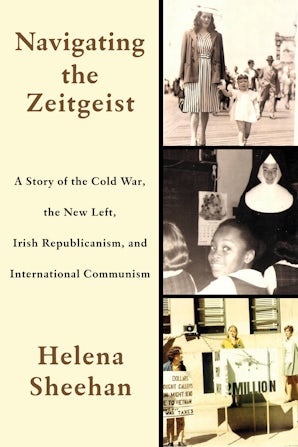The shattering of two worldviews: History Ireland on Helena Sheehan’s “Navigating the Zeitgeist”

Navigating the Zeitgeist: A Story of the Cold War, the New Left, Irish Republicanism, and International Communism
308 pp, $25 pbk, ISBN 978-1-58367-727-8
By Helena Sheehan
Reviewed by Anthony Coughlan, for History Ireland, January/February 2020, vol. 28
Professor Helena Sheehan is internationally known as one of Ireland’s leading left-wing intellectuals. Her book Marxism and the philosophy of science: a critical history, first published in 1985, is the classic work on its subject and is still in print. She has now written her autobiography, covering the first part of her life from the 1940s to the 1980s.
I do not know Dr Sheehan well, but have met her socially on occasion since she came to Ireland. I knew that she was born in the USA of Irish-American and strongly Catholic parents, but until I read this book I had no idea of how involved she had been in the American Civil Rights, anti-Vietnam War, New Left and feminist movements of the 1960s.
Nearly half of this first volume of her autobiography is devoted to this period, as she explored her initial Catholic world-view and then reacted against it to embrace a Marxist outlook—in each case an intellectual totality encompassing nature, society and thought, and in each case calling for a personal commitment to social activism, albeit different forms of it. Her Catholicism led her to join a religious order at eighteen and to spend three years as a novice nun. Her Marxism made her a lifelong radical political activist. Dr Sheehan is a philosopher who has sought not only to understand the world but also to change it. She would indeed contend that, as all thought and ideas are historically grounded, only by actively seeking to improve one’s own society can one come to a true understanding of things.
She moved to Ireland in 1972, her political interest having been aroused by Belfast republican Liam McMillen when on a fund-raising trip to America. Under his influence she joined the Official Republicans, who had split with the Provisionals two years before. By the 1980s she had moved on to the Communist Party of Ireland (CPI) and thence to the Labour Party. She gives an insider account of each of these organisations, in the course of which she pens revealing portraits of Cathal Goulding, Seán Garland, Seamus Costello, Eoghan Harris, Kadar Asmal, Desmond Greaves, Roy Johnston, Betty Sinclair, Michael O’Riordan, Michael O’Leary, Michael D. Higgins and Peadar O’Donnell.
Her regret comes through at the hardening factions and bitter polemics that sundered the Official Republicans (‘Stickies’) in 1974 and led Seamus Costello to break away and found the Irish Republican Socialist Party and its military wing, the Irish National Liberation Army. Those polemics were backed with guns. Seán Garland was riddled with bullets but survived. Liam McMillen, who mediated Dr Sheehan’s move to Ireland and was a close friend, was shot dead on a Belfast street in 1975. Seamus Costello was assassinated in retaliation in 1977. I had personally known McMillen when we were both involved with the Northern Ireland Civil Rights Association in 1967/8 and regarded him as a fine Irishman. So indeed were Costello, Goulding, Garland and the rest in their different ways. It was a tragic business.
Irish readers will home in on these aspects of her story, but inexplicably Monthly Review Press, whose production values are usually of the highest, has omitted an index, so that one must read the text through to find them. That is easy, though, for Dr Sheehan writes very well. Short sentences march purposefully across the page, each carrying its small bundle of fact, insight or wit. As a former Trinity College lecturer myself, I found hilarious her account of Trinity’s Philosophy Department while she was doing her Ph.D there. Her description of life as a teacher in UCD and DCU, with their contrasting academic atmospheres, will interest anyone with connections to these institutions.
While in the CPI she spent months in the Institute of Social Sciences of the USSR doing research for her doctorate on the philosophy of science. She travelled widely in Eastern Europe and interacted with leading intellectuals in the communist countries in the years leading up to the advent of Gorbachaev in 1985. She also has much of interest to write on the Communist Party of Great Britain (CPGB) in the years leading up to its dissolution in 1991, for she knew many of the key personalities among its ‘hard-liners’ and ‘soft-liners’.
All this makes this book much more than Dr Sheehan’s personal story. It describes the shattering of two world-views and counterpoints the political and intellectual trajectories of millions in the later twentieth century as they moved from religious belief to agnosticism or atheism in the first instance, and in the second from belief in Soviet-style communism to liberalism or softer forms of socialism. This makes Dr Sheehan’s autobiography of more than usual historical value as well as being a great read in itself. She captures brilliantly the international and Irish Zeitgeist as it moves from the New Left of the 1960s to the New Right of the 1980s. I look forward to her second volume—desirably this time with an index to both.
Copyright, History Ireland. Reprinted with permission


